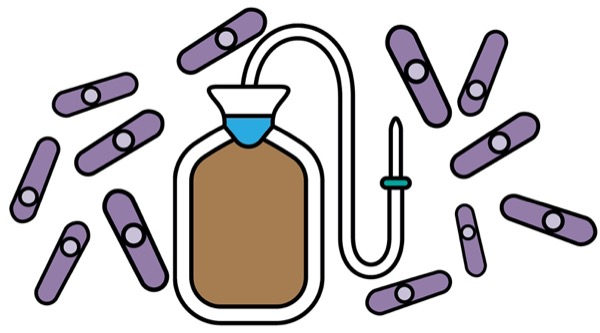Originally published by our sister publication, Gastroenterology & Endoscopy News
A stool-based enema composed of a broad variety of microbes (RBX2660, Rebiotix/Ferring) was up to 84% effective in reducing recurrent Clostridioides difficile infection (rCDI) in a study of more than 720 adults with rCDI. Most responders had no occurrence of diarrhea for up to two years after treatment.
“Collectively, these data demonstrate that RBX2660 is consistently and sustainably effective for the reduction of rCDI in adult patients, as early as first recurrence, after receiving standard-of-care antibiotic treatment,” said investigator Lindy Bancke, PharmD, the head of clinical development at Rebiotix, presenting the data at ID Week 2021.
Dr. Bancke’s analysis included data from five prospective studies of the treatment in patients with rCDI (abstract #167). One ongoing study includes patients with rCDI and underlying inflammatory bowel disease (IBD), irritable bowel syndrome (IBS) and immunocompromised status—individuals “that are more typical of standard rCDI clinical practice,” she noted.
Three of the studies were open-label while two were randomized and placebo-controlled, with a subsequent open-label phase for patients who did not respond to initial treatment and were provided with a second course of the treatment. The duration of follow-up was 24 months in two studies and six months in three studies. A total of 723 patients with rCDI were evaluable for efficacy and included in the analysis presented by Dr. Bancke.
She reported that 50% to 73% of study participants were successfully treated with one dose, compared with 43% to 58% of placebo recipients. Treatment success was defined as an absence of rCDI diarrhea through eight weeks after treatment.
Between 50% and 79% of those who did not respond to an initial dose of the agent achieved treatment success after a second dose, leading to overall treatment success rates of 75% to 84%, Dr. Bancke reported.
Between 82% and 92% of treatment responders remained free of CDI through six months after treatment in the phase 3 program, with “similar rates observed in the phase 2 program out to 24 months,” Dr. Bancke said.
“Additionally, our analyses indicated a consistent safety and efficacy profile for RBX2660 across the expanded populations of patients with IBD, IBS and immunocompromised status,” Dr. Bancke said.
The efficacy of RBX2660 is impressive and falls in line with that of fecal microbiota transplantation (FMT) in rCDI patients, noted Elizabeth Hohmann, MD, an infectious disease physician and the director of Massachusetts General Hospital’s FMT Core laboratory, in Boston, who was not involved the study.
Dr. Hohmann said she administers stool-based, in-house formulated oral capsules to treat her patients with rCDI; although such treatment is effective in most patients, she said a standardized product such as RBX2660 would be preferred.
“There have been some reports of serious adverse effects using stool that has not been properly screened for pathogens, so we need something that is reliably safe, and I look forward to the FDA’s approval of such a treatment,” she said.
Dr. Hohmann noted that infectious disease physicians might find it challenging to administer an enema because “we’re used to prescribing pills, but I hope gastroenterologists would be able to deliver this product.”
This article is from the February 2022 print issue.



Please log in to post a comment